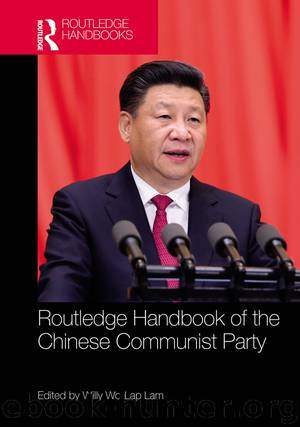Routledge Handbook of the Chinese Communist Party by Lam Willy Wo-Lap

Author:Lam, Willy Wo-Lap
Language: eng
Format: epub
ISBN: 9781134847440
Publisher: Taylor & Francis Ltd
Matland (1995: 167) warns that, “ambiguous policies can breed limited accountability and can lead to creation of mini-fiefdoms with leaders pursuing their own interests. These may have little, if any, connection to the public interest.” There are possible pitfalls in experimental implementation. The initial experiments by the pioneers were “policies” that operated “in areas where there is insufficient knowledge to institute programmed implementation or of how elements in the policy environment are causally connected” (ibid.: 167). Hence, the implementation “process should not be forced into an artificially constrained form” because “[p]rograms demanding conformity are likely to meet with superficial compliance efforts from local implementers” (ibid.: 167). Additionally, ambiguity offers an opportunity to learn new goals and new means insofar as adequate comparison and evaluation are made on sites under experiment such that the learning process does not occur in a random pattern (ibid.: 167). Hence it was questionable if initial local experiments constituted sufficient sources and if there was adequate comparison undertaken for effective learning through evaluation and feedback.
In experimental implementation, the system (unlike that in administrative implementation) is open to environmental influence. The “opportunities are excellent for bureaucratic entrepreneurs to create policies to deal with local needs” (ibid.: 166). It is in this sense that experimental implementation offers “an opportunity for policy learning rather than achieving policy outcomes” and the “process requires a conscious realization that learning is the goal” (ibid.: 167). But, such a policy learning process ceased as soon as the reform took center stage. While the RTFR policy goal to reduce the peasant burden was clear, the means to achieve such a goal was contradictory, notwithstanding differing conditions in the local contexts. Göbel (2011: 165) judges that the central government’s role in the reform is not a creative one because:
the course of the reform was chartered mainly at the county and sub-county levels. In contrast to the central government, which fixed the parameters and outlined the directions of the reform, and these local actors, which fine-tuned, implemented, or resisted it, the provincial governments played the role of a switchboard without getting too deeply involved in the reform.
Download
This site does not store any files on its server. We only index and link to content provided by other sites. Please contact the content providers to delete copyright contents if any and email us, we'll remove relevant links or contents immediately.
| Anthropology | Archaeology |
| Philosophy | Politics & Government |
| Social Sciences | Sociology |
| Women's Studies |
The Secret History by Donna Tartt(19086)
The Social Justice Warrior Handbook by Lisa De Pasquale(12190)
Thirteen Reasons Why by Jay Asher(8909)
This Is How You Lose Her by Junot Diaz(6885)
Weapons of Math Destruction by Cathy O'Neil(6279)
Zero to One by Peter Thiel(5801)
Beartown by Fredrik Backman(5754)
The Myth of the Strong Leader by Archie Brown(5507)
The Fire Next Time by James Baldwin(5442)
How Democracies Die by Steven Levitsky & Daniel Ziblatt(5218)
Promise Me, Dad by Joe Biden(5153)
Stone's Rules by Roger Stone(5087)
A Higher Loyalty: Truth, Lies, and Leadership by James Comey(4960)
100 Deadly Skills by Clint Emerson(4924)
Rise and Kill First by Ronen Bergman(4788)
Secrecy World by Jake Bernstein(4752)
The David Icke Guide to the Global Conspiracy (and how to end it) by David Icke(4717)
The Farm by Tom Rob Smith(4507)
The Doomsday Machine by Daniel Ellsberg(4490)
